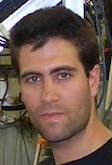


Dr. Ismael Díez-Pérez
Dr. Díez-Pérez obtained his degree in Chemistry from the University of Barcelona in 2000. He completed his Master’s degree in Electrochemistry at the Physical Chemistry department of the same university, and continued with his PhD project trying to deepen into the fundamental aspects controlling Passivation and Corrosion processes at metal/electrolyte interfaces. An essential part of his PhD training was conducted in several international renowned institutions such as the Lawrence Berkeley National Lab in USA (Prof. Miquel Salmeron) and the University Pierre Marie-Curie in France (Prof. Philippe Allongue). His PhD research resulted in the development of a novel electrochemical tunneling spectroscopy approach to interrogate meta/electrolyte interfaces at the nanoscale; work that was awarded with the ISE-prize Hans-Jürgen-Engell in 2008. After graduating in 2006, he was awarded with a Marie-Curie fellowship to develop his postdoctoral project in Arizona State University under the supervision of Prof. Nongjian Tao. There, he explored fundamental aspects of charge transport of metal/molecule interfaces and was immersed in the field of Molecular Electronics. He actively helped in the development of new single-molecule junction methods and was able to demonstrate several basic electrical behaviors in a single-molecule wire, namely, diode effect, transistor behavior and electromechanical effects. Such results were published in prestigious journals of the Nanotechnology and Chemistry fields. In 2011, he received an European Reintegration grand to work as a senior researcher at the Institute for Bioengineering for Catalonia, where he opened up a new research line in BioMolecular Electronics. In 2012, he got his assistant professor position at the Physical Chemistry department of the University of Barcelona, where he currently supervises a wide variety of projects involving the study of fundamental charge transport in (bio)molecules, spanning from simple synthetic backbones to complex biomolecular moieties that participate in biological electron transfer. In the last 4 years, his group has already presented original results in single-molecule devices showing a variety of novel responses to external stimuli such as photo-switching and magnetoresistance, and has developed tools to study electro-catalytic processes at the single-molecule level.